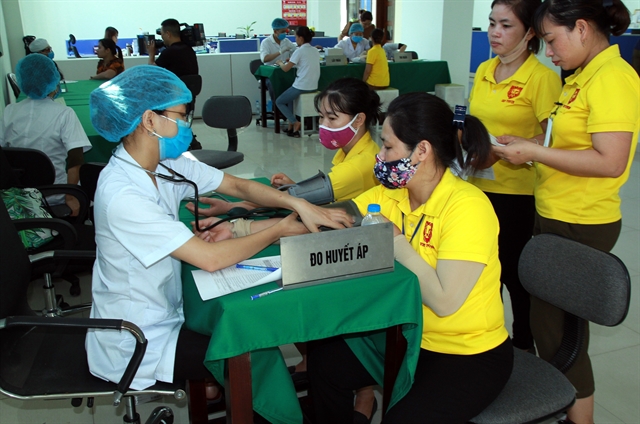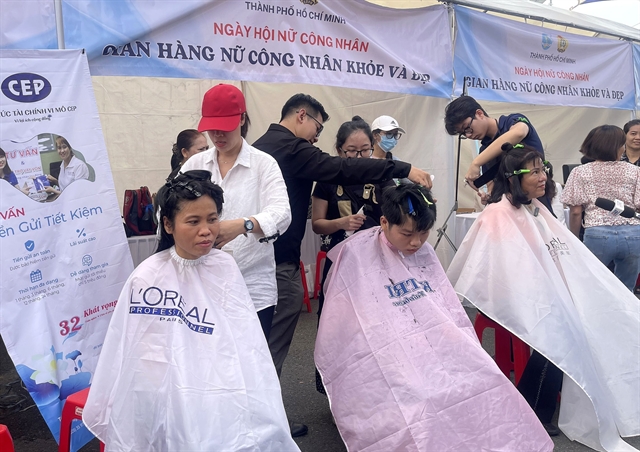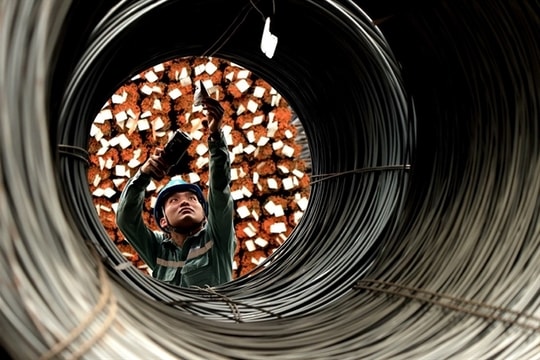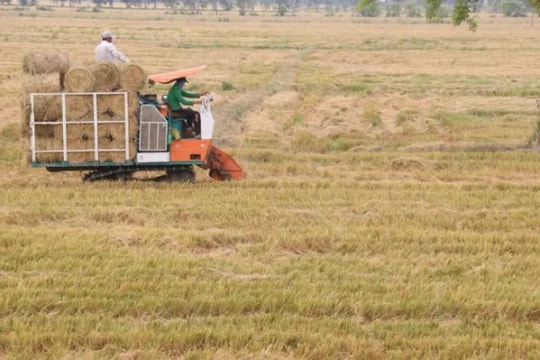 |
| Female workers at Vietpower Co,Ltd in the northern province of Nam Định get free health check-up. VNA/VNS Photo Văn Đạt |
HÀ NỘI — In numerous industrial and export processing zones, women make up the majority of the workforce. However, as they reach their mid-30s, many face challenges in sustaining both their employment and health, experts have said.
This has highlighted the need for policies to safeguard the rights of middle-aged female workers.
Trần Thị Thu Hiền, from Quế Võ Town in Bắc Ninh Province, used to work for a company in Hà Nội. As a migrant worker earning less than VNĐ10 million (US$406) per month, she couldn’t afford to maintain her life while paying for rent and childcare.
As a result, she returned to her hometown to live with her parents and left her child in their care to save money.
“For us, the most important thing is having a job, followed by health,” Hiền shared.
To find employment, she has participated in local job fairs, hoping to find a suitable position. With warehouse management experience, Hiền is aiming for a job with a salary of around VNĐ8-9 million ($325-$366) per month, which would be more manageable living in her hometown compared to a big city.
Meanwhile, Trịnh Thị Tươi, 44, who had worked at an electronics manufacturing company for nearly a decade in Quế Võ Industrial Zone 1 in Bắc Ninh Province, has switched jobs several times but had to quit due to health issues, including poor eyesight and numb hands. She voluntarily resigned to claim unemployment benefits.
Tươi still wishes to continue working as an employee, as the income is more stable and higher than farming.
“Given my current health, I’m considering vocational training or switching to small-scale trading,” she shared.
Nguyễn Thị Lệ, 39, previously worked for a company in Bắc Từ Liêm District in Hà Nội, but lost her job when the company dissolved.
“I’m still healthy and want to work for a company, but I was rejected after my application was reviewed because I lack the necessary job skills. I’ve interviewed at a garment company and plan to save up and eventually return to my hometown,” Lệ shared.
Vũ Tiến Thành, Deputy Director of the Employment Service Centre in Bắc Ninh Province, mentioned that Bắc Ninh is a place where female workers can easily find jobs, as many employers prefer female workers due to the meticulous nature required in the electronics industry.
However, in 2023, the centre received 15,000 unemployment benefit applications, of which 20 per cent were from women over 35 years old.
Nguyễn Thị Minh Ngọc, Vice President of the Bắc Ninh Provincial Federation of Labour, stated that female workers are at a higher risk of being laid off compared to their male counterparts and face many disadvantages.
On average, female workers earn 13 per cent less than male workers.
Despite their workload, female labourers still bear the burden of household chores and caring for their families after work. For women over 35, it becomes even more challenging to find stable employment, especially in industries that do not require advanced skills.
Trần Thu Phương, Deputy Head of the Women's Affairs Committee at the Việt Nam General Confederation of Labour, also noted that female workers performing simple tasks often face difficulties finding jobs after the age of 35.
"Female workers who lose their jobs not only struggle to provide for their families but also face significant challenges in finding new employment. A current issue is that after completing training, especially short-term courses lasting less than a year, many workers cannot find suitable jobs if their company closes down, as they are unable to meet the demands of modern businesses,” she said.
Additionally, female workers are at a disadvantage when adapting to the labour market due to health concerns and limited ability to acquire new skills, particularly in information technology," Phương explained.
The Centre for Development and Integration, a Vietnamese NGO, reported that the labour force participation rate for Vietnamese women is 72 per cent, the second highest in the world. However, 81.6 per cent of female workers have not received vocational training and are facing many challenges.
In reality, inequalities persist in terms of working conditions, wages and career advancement. The wage gap between men and women is currently around 13 per cent.
Notably, female migrant workers with seniority, families and stable incomes tend to remain loyal to their companies. On the other hand, younger female workers who are starting families or raising small children tend to return to their hometowns or seek employment in industrial zones closer to home after spending time away from their families.
Reducing inequality
Recently, trade unions at all levels have asked employers or sought external support to provide gifts to female workers facing difficult circumstances, in both cash and in-kind. Most of these women are over the age of 35, helping them stabilise their lives and feel secure in their work.
For example, during Workers' Month in May and the anniversary of the Trade Union's founding in July, local trade unions organised health check-ups and consultations for female workers.
Đặng Thị Thuận, from Yamaha Motor Vietnam Factory, said that the Trade Union facilitated free cancer screenings for female workers. The company’s Trade Union also organises annual health check-ups for all workers.
"Regular and free health screenings like this help us workers feel more secure and committed to the company," she said.
 |
| Female workers get their hair cut free of charge at an event for female workers co-organised by Việt Nam Women's Union and HCM City's Confederation of Labour. VNA/VNS Photo |
Nguyễn Văn Công, a Human Resources specialist at Dreamtech Co., Ltd in Bắc Ninh Province, shared that the company, which specialises in assembling electronic components, does not schedule overtime for pregnant employees past seven months or those with children under six months, although it may become challenging for the firm during peak production periods.
"This creates challenges during peak production times. Female workers, who also have family responsibilities, find it difficult to commit to overtime," he explained.
Công also mentioned that the company has introduced several policies to retain employees, including creating a healthy work environment, organising recreational activities and providing opportunities for workers to enhance their skills and grow with the company.
"Another key factor is offering salary bonuses that increase yearly," Công added.
Many initiatives have been implemented to bridge the gender gap and promote equality for female workers.
As for developing policies for female workers, the Women's Affairs Committee at the Việt Nam General Confederation of Labour contributed to the drafting of the 2019 Labour Code and Decree No 145/2020/ND-CP. This includes policies such as prohibiting the termination of contracts for women who are breastfeeding children under 12 months old.
The committee also pushed for measures ensuring job security for women returning from maternity leave, installing breastfeeding rooms at workplaces, providing childcare support for children under six years old and offering vocational training tailored to the physical and physiological characteristics of women, including their role as mothers.
The Việt Nam General Confederation of Labour has implemented workplace dialogues focused on fair recruitment policies that do not discriminate based on gender. The unit prioritised recruiting and retaining female workers who meet the necessary job qualifications and advocated for the renewal of labour contracts for women when their current contracts expire.
Furthermore, the unit proposed that maternity leave be included in seniority calculations for determining wages, bonuses, allowances, training opportunities and career advancement.
The confederation recommended providing vocational retraining for older female workers, especially in fields suited to their physical and physiological needs, and implementing allowances for transportation, housing, seniority, childcare and preschool support. — VNS
























